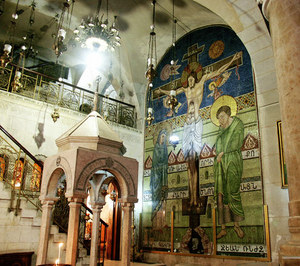by Manuela Borraccino
Rome - December 9, 2008
Christians in the Holy Land face innumerable hardships, but one organization committed to helping ease their suffering - and those of other religions who are struggling - is the Catholic Near East Welfare Association, a pontifical agency for humanitarian and pastoral support. The organization's Secretary General, Msgr. Robert L. Stern, spoke with Terrasanta.net recently about the challenges facing Christians there, the Pope's planned visit to the Holy Land next year, the possible impact of a new American President, and the importance of international aid to the region.
Monsignor Stern, what are the main problems from your perspective?
Christians in the Middle East are in a sense strangers in a strange land, even though they have been born there, because if they live in Israel, they live in a Jewish state and society. In all the other countries, they live in a Muslim state and in Muslim society. So even though they are descendants of the original inhabitants of the land, still they are made to feel that they don't "fit" anymore. Sometimes, the way they live and talk encourages this because Christians identify with the West. The paradox is that sometimes in the Holy Land they say: you Christians don't belong here, you belong to Western Europe. And yet, this is where Christianity started.
So they are second class citizens?
In Islam, Christians and Jews are considered people of the Book, and therefore they are respected as forerunners of Islam but not fully conforming to the Will of God. And so they are second class citizens, but they have a unique status. In Israel of course, in a Jewish state, if you are not a Jew, even though it's a democratic society, you are in fact a second class citizen as well. So it's the very nature of being a Christian in that part of the world. And in that part of the world your religious identity comes first; in the West it's more your national identity that comes first.
In which countries is there discrimination against Christians?
If you don't identify entirely with all their values, then, depending on the countries, it varies. Let's take Egypt for example: to really succeed in many roles, in politics and business, your chances are better if you are Muslim. It doesn't mean that to succeed is impossible, but it's human nature...There's a kind of discrimination which is the way people act when they deal with someone who is not quite a member of their own group.
 What is the future for Christians in the Middle East?
What is the future for Christians in the Middle East?
Well, if you look at it very dispassionately, from a sort of sociological point of view (sociologists look at trends and the statistics of 500 years ago, 1000 years ago, 100 years ago), what seems to be happening is the exodus of Christians from all over the Middle East. Right now, Israel-Palestine has the smallest proportion of Christians than in any country of the Middle East...What we are really seeing over the centuries is an accelerating movement of Christians away from that part of the world.
What role can Christians play in those societies?
Christians as minorities are, generally speaking, well-educated professionals and compared to their numbers they have an important influence in each of the countries in which they live. And that's a contribution. I also feel that the Christians can be a sort of bridge because in most of the countries they are Arabs, but they are not Muslims. They can be a connection between the modern societies of the Western world and emerging societies in the Islamic world because they are Arabs and they are Christians.
What are your expectations for Barack Obama's presidency?
I guess my hope, especially as an American citizen, is that the new president will bring certain perspectives. If you grow up as a child of an American mother and an African father, if you grow up as a child of a Christian mother and a Muslim father, if you are born in Hawaii and you go to school in Indonesia, then you understand differences better - at least during his campaign he seemed to speak of that. So I hope that he would bring a type of perspective.
Next year the Pope will visit to Israel. Do you have any thoughts on that?
It'll be a great shot in the arm for them. It's exciting because when the Pope comes, the whole world follows him. I was there when Pope John Paul II came and, at that moment, everybody in the Holy Land - Muslim, Jew, Christian - everybody spent the whole day watching this white little man in a white robe praying and talking and offering Masses, visiting people. It was a moment of peace in the midst of the storm. In that period, and for a short while after, everybody seemed to be calm, and then, of course, the Second Intifada exploded and tensions renovated. I hope that Pope Benedict will be the same. He's "Pontifex", the bridge-builder. I hope he's very "pontifical" when he's there. I hope that his presence, his words and his prayers will bridge these terrible gaps between groups, religions and politics.
What are your views on international aid to Christians in the Holy Land?
We have to be concerned about the people who live there, our brothers and sisters, and all the people who live there, not only Christians. Sometimes we say: charity begins at home. At least, we have to be concerned about our fellow believers and with them and through them be concerned about them. Yes, they need a lot of help. They need to know that somebody cares. That's the most important thing of all. They don't quite "fit" in their own societies, and they don't seem to have much consolation from their brothers and sisters elsewhere.


Leave a comment